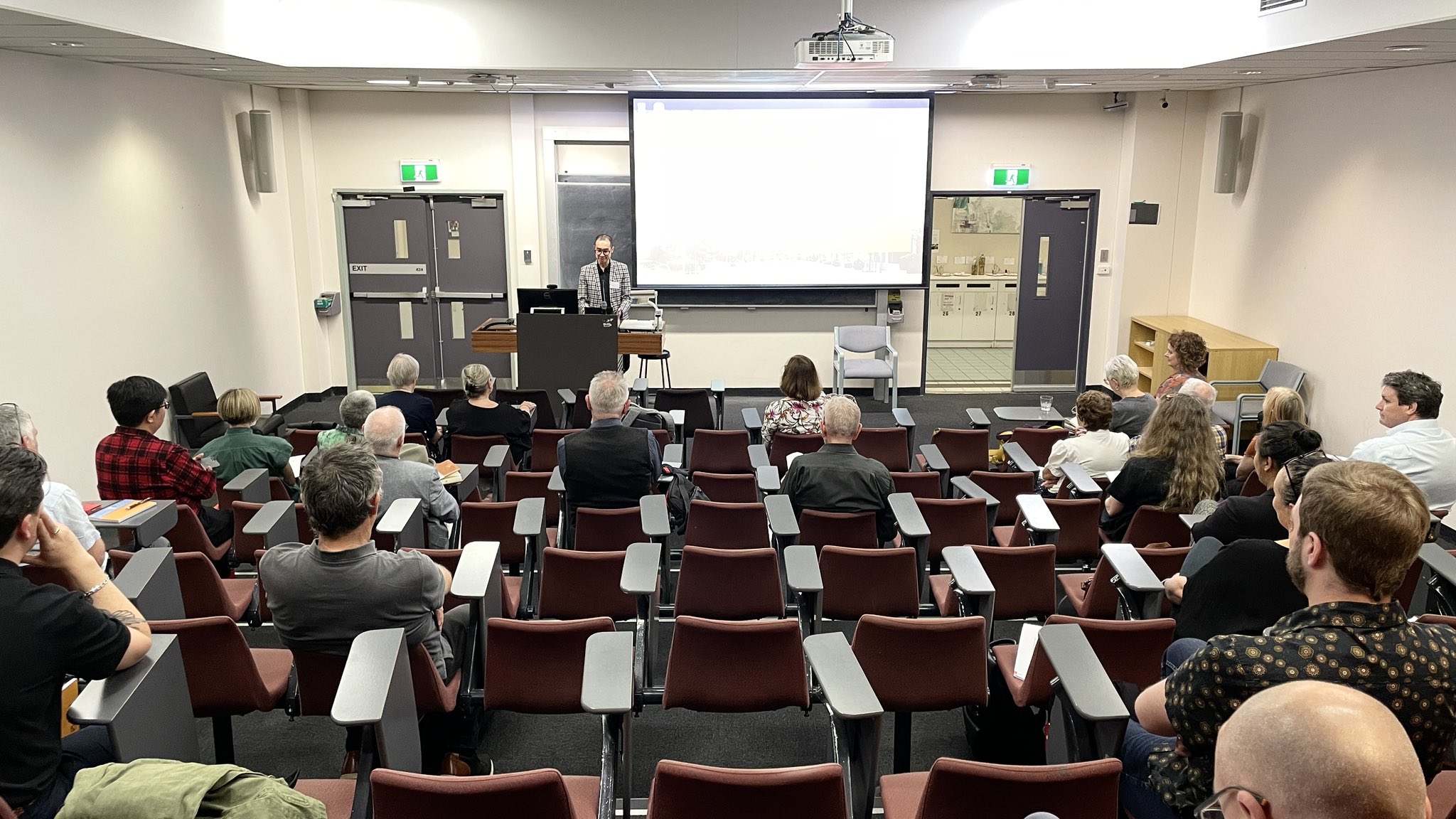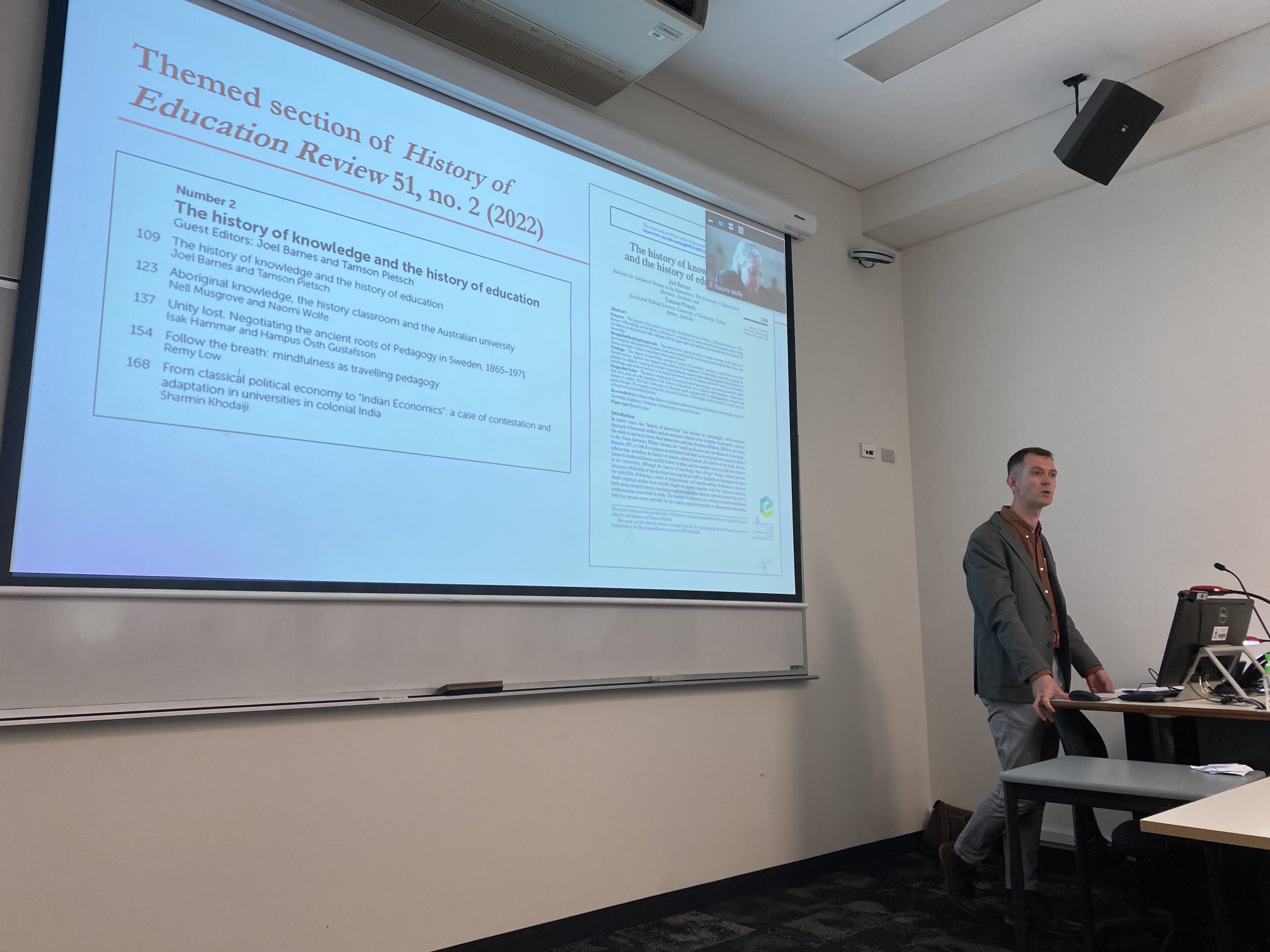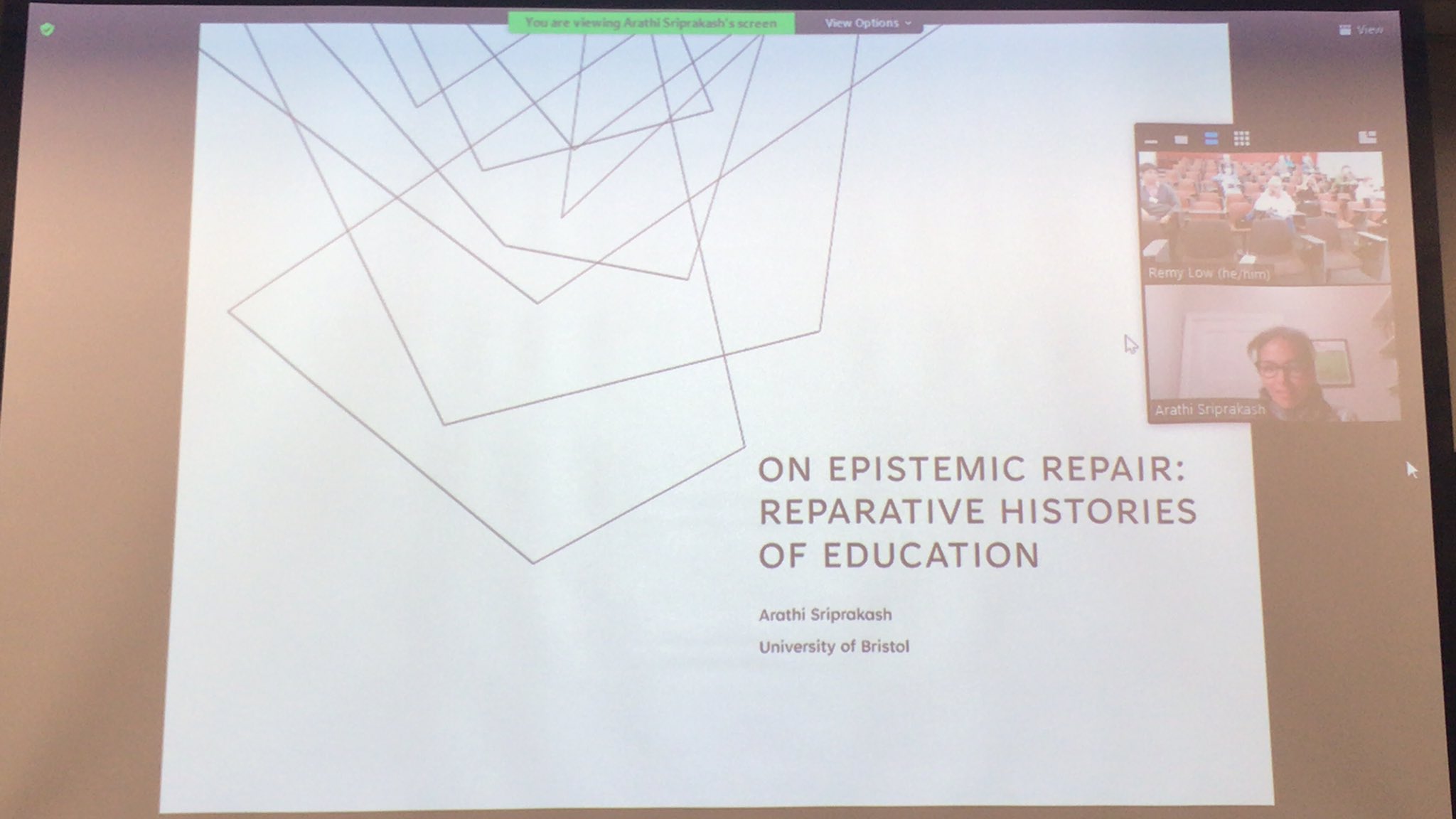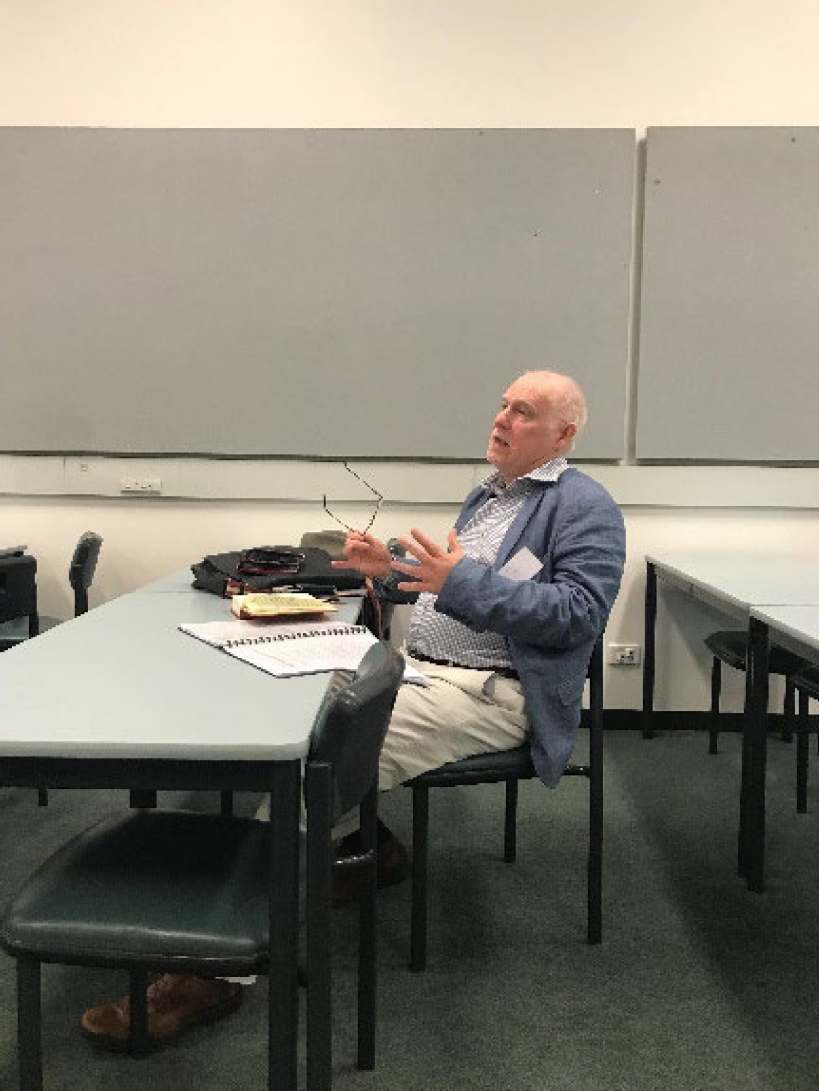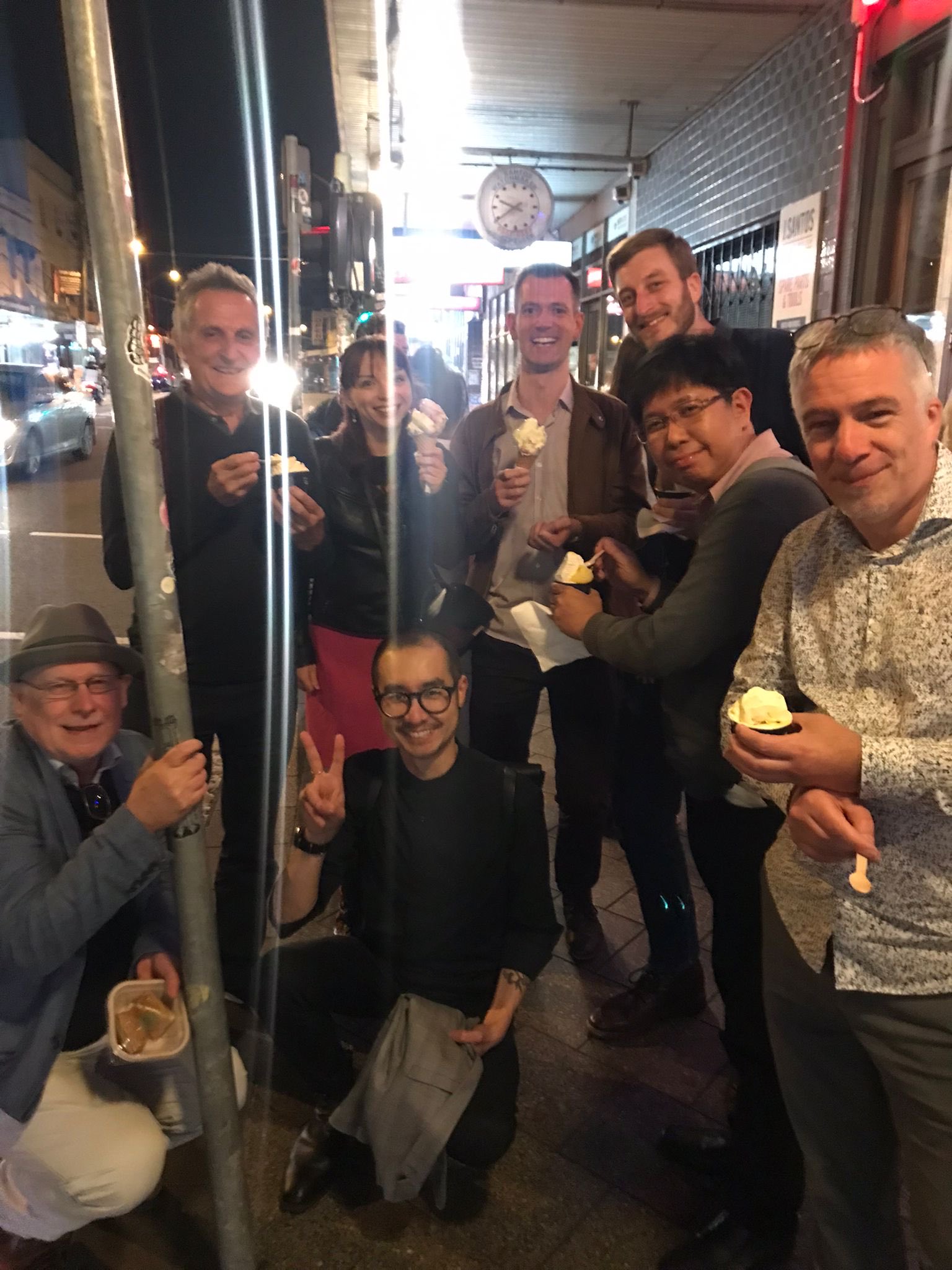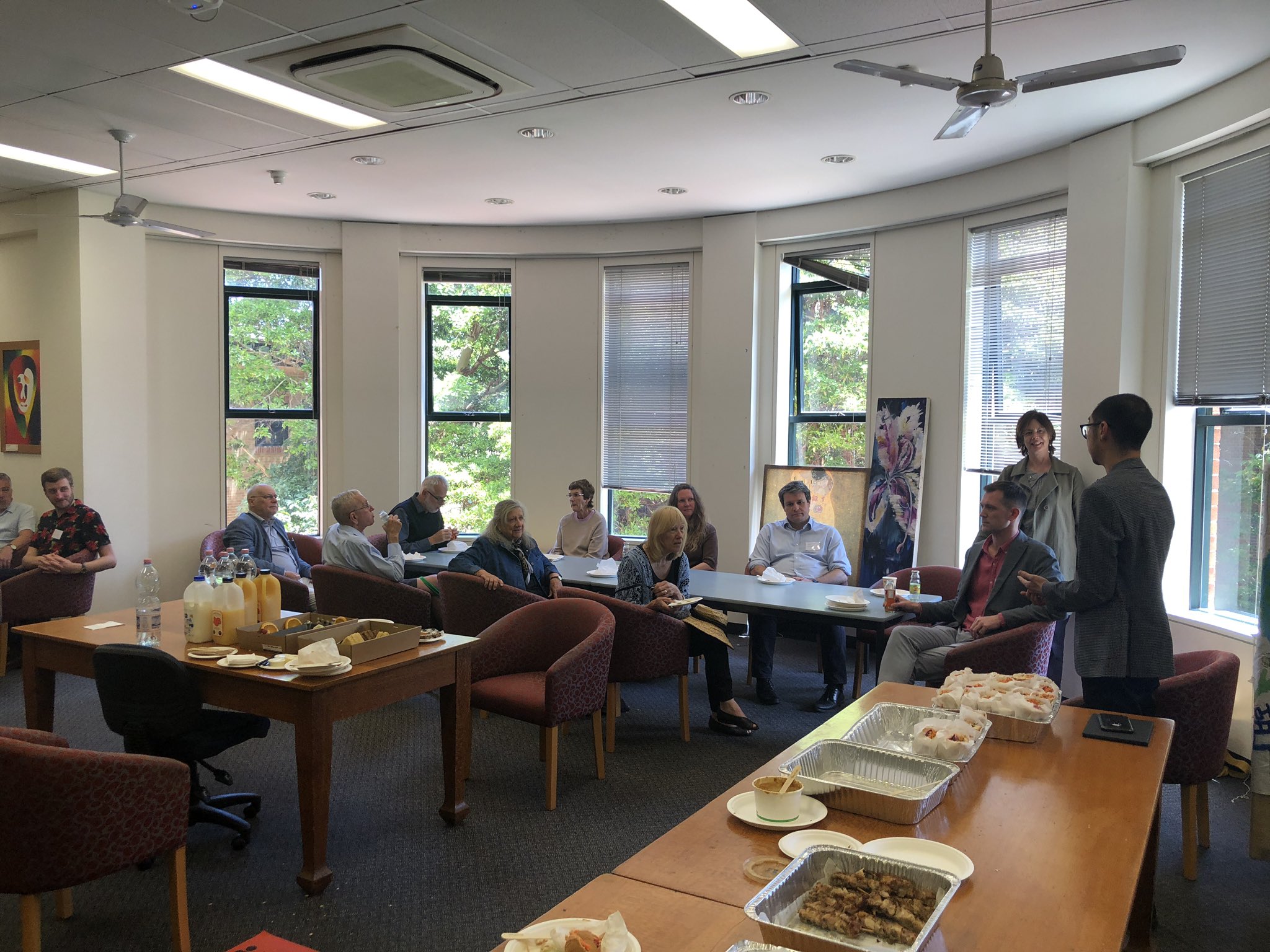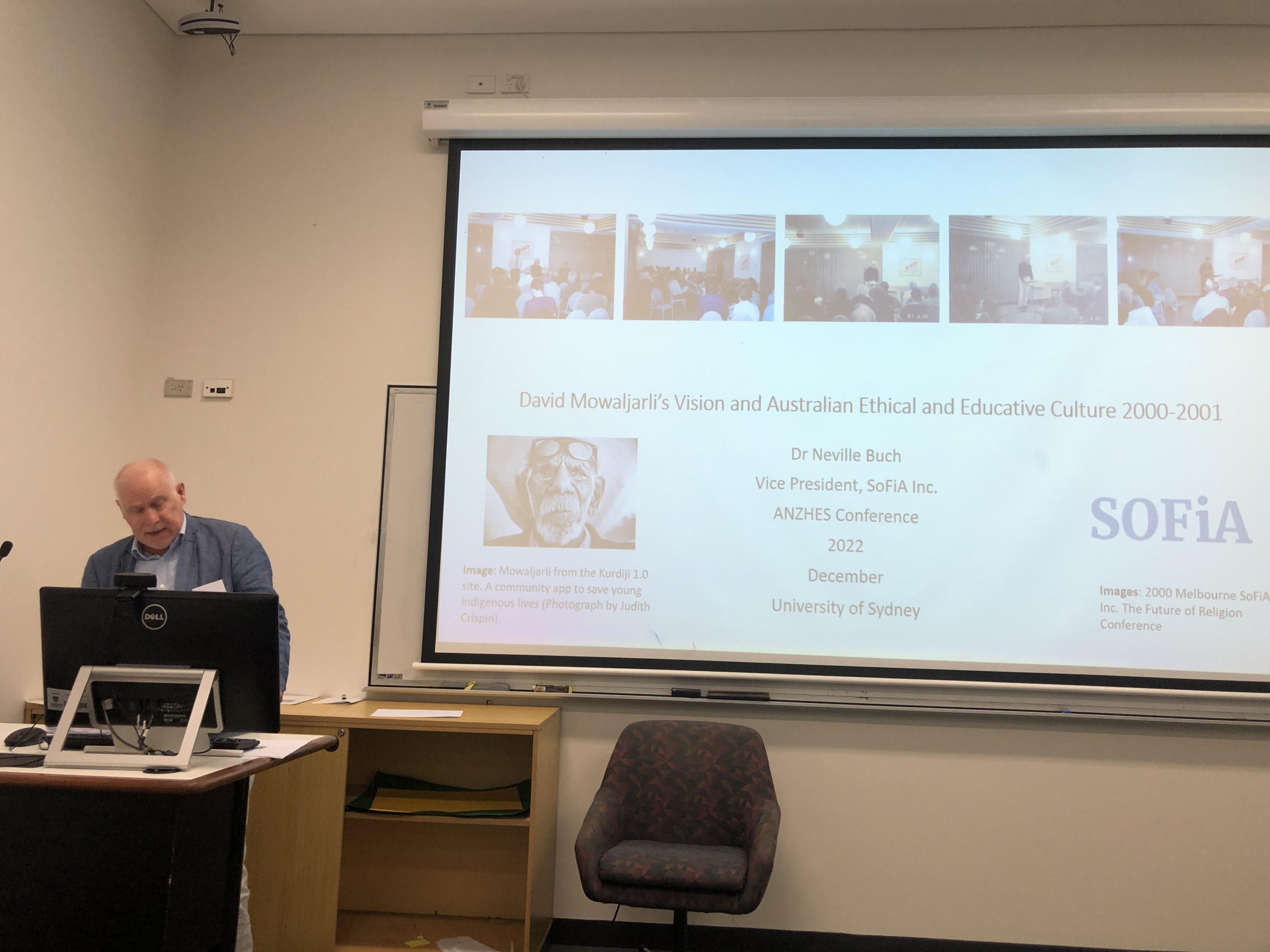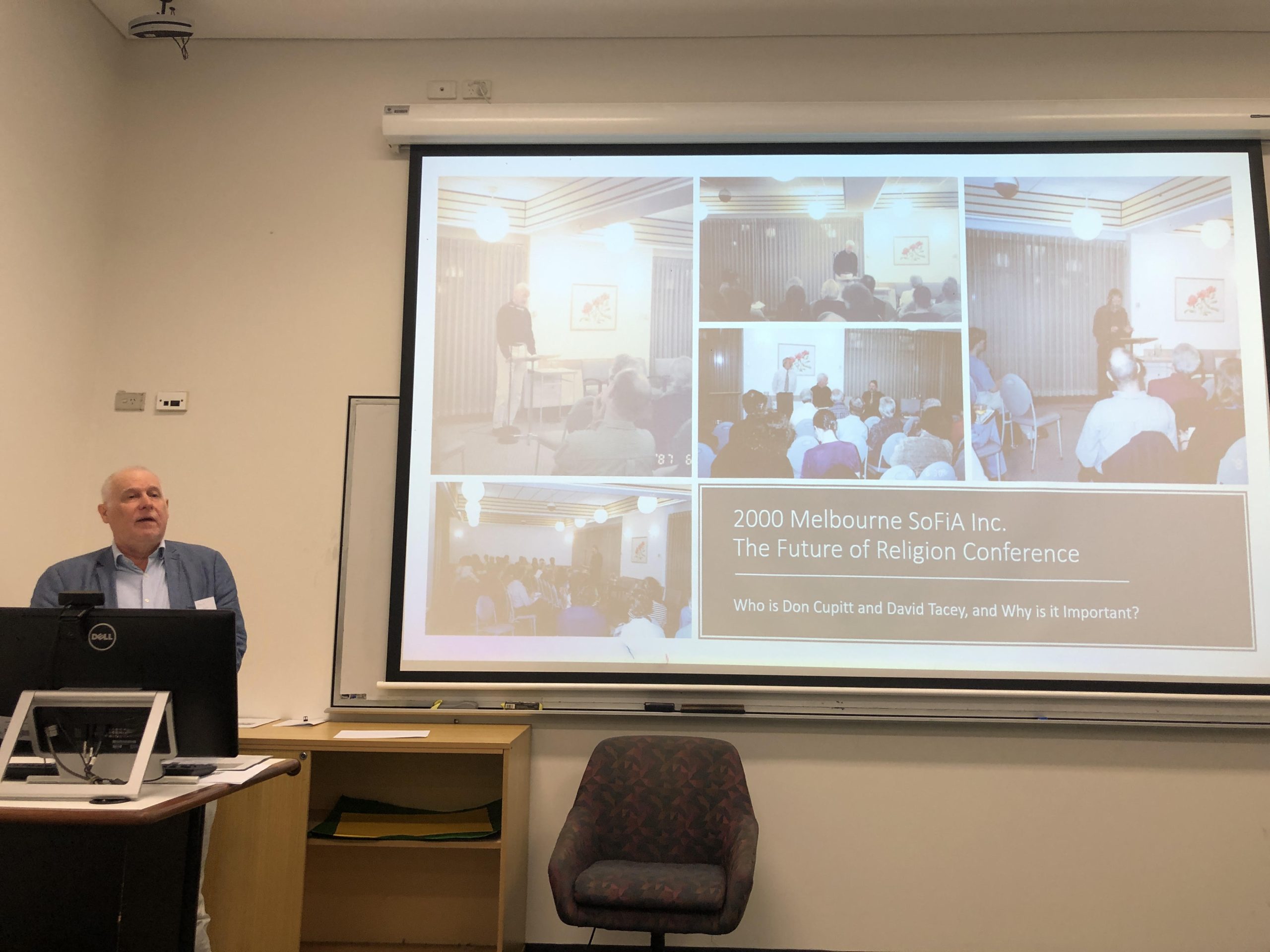The 2022 Australian and New Zealand History of Education (ANZHES) Conference
From selections of the ANZHES Newsletter December 2022, with comments.
This blog article — call it what you like — “academic”, “populist”, “community”, any political semantics, to ignore it, Minister of Education, cannot be so dismissed. The communities demand an answer on the state of affairs in our education system. This call and the blog article is based on the earlier piece, in the ANZHES Newsletter: The State of Affairs for Professional Historians in Queensland Educationalist History, May 2021, pp. 5-6. I wrote at the time, more than 12 months ago, “There are those who are not prepared to leave the matter unresolved. We will not leave it to the cynics (postmodernist or otherwise) who think that ‘history should run its course’, in an idiocy of the naturalistic fallacy.” The challenge has been made, a very intelligent answer is required for all communities.
Image: 2022 ANZHES Launch, around 12.00 p.m., Wednesday 7 December 2022, Education Building, University of Sydney, New South Wales, AUSTRALIA
Reflections on the 2022 ANZHES Annual Conference
By Robert Stevens
This was my first ever ANZHES conference. At 65 years of age this was a late start, but better late than never. My academic background is in Philosophy, and although I have studied History at University as an under-graduate, I studied mainly Philosophy (but also Education) at a Post-graduate level.
Education is a highly multi-disciplinary study involving History, Sociology, Psychology and Philosophy, intersecting to varying degrees. This feature makes Education and the History of Education a rich, diverse and exciting discipline. This richness was on full display at the ANZHES Conference.
My own conference presentation was philosophical and psychological, looking at a deep history of reasoning. In order to understand the origins of reasoning we need to understand what reasoning is.
Many papers examined epistemological issues in relation to the history of education. In his excellent paper The History of Knowledge and the History of Education Joel Barnes provided an overview of the history of knowledge for the benefit of historians of education examining some of the ways history of knowledge approaches might be useful for historians working on the history of education. Again, in order to study the history of knowledge, we need to have a clear understanding of what knowledge is and where it comes from. This is a philosophical question that the authors deftly addressed. Neville Buch [spelling corrected] drew on the entire history of Philosophy, and how the work of a broad range of Philosophers throughout history relate to each other in seeking to shed light on David Mowaljarli’s Vision and Australian Ethical and Educative Culture.
Image: Joel Barnes, The History of Knowledge in the History of Education, around 12.00 p.m., Thursday 8 December 2022, Education Building, University of Sydney, New South Wales, AUSTRALIA
Remy Low examined an entirely different approach to knowledge as insight that can be gained by mindfulness meditation, and how mindfulness has been taught.
The nature of knowledge and who determines what counts as knowledge and what should be taught was an issue at the heart of Tamson Pietsch’s brilliant Presidential address aptly titled “Knowing the world in the 1920s.” The presentation focused on the establishment of a floating university informed by a strong empiricism that it was through direct sense experience in and of the world that students learn world-mindedness. The political battles around the floating university were intense, played out over a dispute between rationalism and empiricism focusing on a knowledge boat or ship of fools depending which perspective on knowledge we take.
Knowledge and forgetting were key themes in Anna Clark’s wonderful presentation “The sounds of silence in Australian History.” Such silences are seldom total. Anna argued that beyond the disciplinary silence (in school and academic History texts), Australia’s Indigenous history was remembered in fiction and poetry for example, and in Indigenous histories. Not all knowledge is official, and official and unofficial knowledge can interact.
In addition to epistemological issues being explored in the History of Education, ethical issues, and the role of History in promoting a more just world were themes explored in a number of papers. In her Keynote, “On epistemic repair: reparative histories of education”, Arathi Sriprakash examined the role of history of education in understanding the formations of injustice as well as repairing these injustices. To repair injustices historians, need a clear understanding of philosophical issues about the nature of justice and how, more generally, we should live.
Image: Arathi Sriprakoash, Reparative Histories of Education, around 3.00 p.m., Thursday 8 December 2022, Education Building, University of Sydney, New South Wales, AUSTRALIA
A key philosophical issue concerns the ethics of human relationships with the broader living world. How should we live in relation to the more than human world? Frances Kelly insightfully examined these issues in her presentation in “A pleasant walk on the Pakihi’: mid-century experiments connecting children with place.”
I learned a great deal from this short but highly illuminating conference about the interaction between the disciplines of History, Education and Philosophy. In addition to the presentations and discussion, I learned much from informal discussions over coffee and cake.
Image: Neville Buch, 2022 ANZHES Conference, around 3.00 p.m., Thursday 8 December 2022, Education Building, University of Sydney, New South Wales, AUSTRALIA
Reflections on the 2022 ANZHES Annual Conference
By Neville Buch
My name is Neville Buch. I work with non-university scholarly communities in public history and philosophy. Furthermore, sociology and worldview studies are involved in that cross-disciplinary engagement. That work then feeds into reflection, further research, writing, and publications, of the kind where I hope to contribute to next year’s ANZHES’ conference.
The conference program spoke of David Mowaljarli in terms of connections and relations, and I recalled it was David Tacey, and his work on enchantment, who made the connection to David Mowaljarli’s vision of country spirituality visible at an October weekend seminars on the “The Future of Religion”; organised by the Sea of Faith in Australia Inc., in the year 2000. Twenty-two years ago, the conversation was on how “the West” framing could be better understood to allow Reconciliation with First Nations people. The language and agenda have changed in a matter of degrees to “The Voice” and listening to Aboriginal and Torres Strait histories being told by indigenous persons. My message in my presentation was that the overlapping between European and Aboriginal narratives, theorised via Don Cupitt’s Philosophy of Language, is very much required and is an important key to the success of the Yes vote.
Robert Stevens’s presentation, “A deep history of reasoning”, provided the epistemic foundations for my message. Educational theories have had a rough time in the past 30 years, with radical postmodern formulations which just re-enacted the stratagems of early twentieth century hard rationalism, disconnected behaviouralism, and reductive positivism. Rob demonstrated that there are no such discords, binaries, and cognitive separation from deep history and the Classics of both “East and West”.
Image: The ANZHES Dinner Party, around 10.00 p.m., Thursday 8 December 2022, Outside of the Cow & The Moon, 181 Enmore Road, Enmore, New South Wales, AUSTRALIA
Reflections on the 2022 ANZHES Annual Conference
By Tao Bak
My name is Tao Bak. When I’m not at the ANZHES conference I’m usually busy with work, family or my social life. My current role is Language and Learning Adviser at Deakin University, Melbourne, where I look after the extended hours study support services, facilitate thesis writing groups, provide individual consultations for students and develop resources, among other things. I have also do some work for the School of Education at Deakin in supervising independent research project students as part of the Research Pathways program. In terms of my family, I have two daughters, the youngest of which has just finished Year 12. As a result, my wife and I are looking forward to having a bit more time for other things. For me that includes music. One of my creative outlets is playing guitar and writing, performing and recording songs, something I hope to do more of in the coming months and years.
This was the sixth ANZHES conference and the first I have attended in person since completing my Doctorate in 2021. I have thoroughly enjoyed each ANZHES conference I’ve been to and have always found them both stimulating and supportive. I thought the theme of this conference, ‘Connections and Relations’, was particularly inspiring and I relished the opportunity to submit a presentation for it as a way of continuing to think about and develop my research.
Image: The Wrap-up of the 2022 ANZHES Conference, around 12.30 p.m., Friday 9 December 2022, Education Building, University of Sydney, New South Wales, AUSTRALIA
The main highlight for me was being able to attend in person again. I very much enjoyed meeting new scholars in the field as well as the chance to reconnect with those I knew but hadn’t seen for some time. The first day theme of Education and Colonialism ensured this important topic was given a clear focus from the beginning and I thought was a great way to start. The sessions I attended were of a high standard and ranged between histories of education in Canada, New Zealand and Australia, covering a wide array of topics. The papers often had fascinating and not always obvious connections between them, which added to their richness. The conference dinner at the Alley Duong Hem Vietnamese restaurant was both delicious and pleasantly informal with the opportunity to sample the famous artisan gelato across the road also a delight. My final impression was that attendees left having very much enjoyed the replenishing few days of ‘collegiality, scholarly exchange, and friendship’ that the conference program had offered. I am looking forward to gathering again in Auckland in 2023.
**#**
Image: Neville Buch, David Mowaljarli’s Vision and Australian Ethical and Educative Culture 2000-2001, around 9.30 p.m., Thursday 8 December 2022, Education Building, University of Sydney, New South Wales, AUSTRALIA
My presentation to the Australian and New Zealand History of Education Society focused regarding the ‘white thinking’ on David Mowaljarli’s Vision and Australian Ethical and Educative Culture 2000-2001. For connections and relations to David Mowaljarli’s vision of country spirituality, it will need the overlapping of ‘non-western’ and ‘western’ framing in both imagination and intellectual history. Indeed, the history of the last few decades have shown that it is a compatibilist journey.
Patterns in the dialogue began with Australian philosopher David Tacey and his work Re-Enchantment: The New Australian Spirituality (2000), and the conversations which occurred in the same year of publication, at the Melbourne Sea of Faith in Australia Inc. (SoFiA) seminars, called, ‘The Future of Religion.’ This was two decades ago, and occurred principally between David Tacey, Don Cupitt, the philosopher of religion, and the Rev. Dr. Francis Macnab, a psychotherapist and minister at St Michael’s, one of the foremost liberal Uniting Church in the country.
SoFiA, St Michaels, and other radical Christian communities are the educative settings in the country for the dialogue in ‘country spirituality.’ Apart of this is the vision in David Mowaljarli’s thinking, but there are other parts compatible for reconciliation, empowerment, and enchantment. The issue of praxis, however, remains the challenge. White historians, sociologists, and philosophers are engaging with the local Aboriginal and Torres Strait Islander (ATSI) voices but are greatly challenged. The voice has to be indigenous, and it has reached the national Uluru Statement from the Heart. The intellectual voices, though, are largely white, attempting engagements with an emerging-but-marginalised indigenous or ATSI intelligentsia. The pattern has been as it was in the 2000 SoFiA Melbourne seminars – white but correctly drawing upon the western framing, with an honest attempt to understand culture of ‘The Other’ from the thinking of the French philosopher, Emmanuel Levinas. For Levinas, ‘the Other’ is not knowable and cannot be made into an object of the self, as is done by traditional metaphysics, but there is a responsibility towards the Other which precedes any ‘objective searching after truth.’ Levinas’ methodology-mythology on culture, religion, and politics expresses ethical studies and the historical ethos of what is called, the Ethical Cultural movement.
The challenge to the Ministers of Education across the country is how is the current curriculum, across the state sectors, reflective of all education insights from the 2022 ANZHES Conference? Change in our education systems only happens when there is a loud outcry from the communities, representatives across the broad and compatibilist society, defying the deliberate and false political divides.
Image: Neville Buch, David Mowaljarli’s Vision and Australian Ethical and Educative Culture 2000-2001, around 9.40 p.m., Thursday 8 December 2022, Education Building, University of Sydney, New South Wales, AUSTRALIA
Neville Buch
Latest posts by Neville Buch (see all)
- Dear grossly, ethically, corrupted - December 21, 2024
- Thoughts with a Professional History colleague on “Artificial Intelligence” - December 21, 2024
- Stephanie M. Lee on “AI by omission”, The Chronicle of Higher Education, Thursday, December 19, 2024 - December 20, 2024

